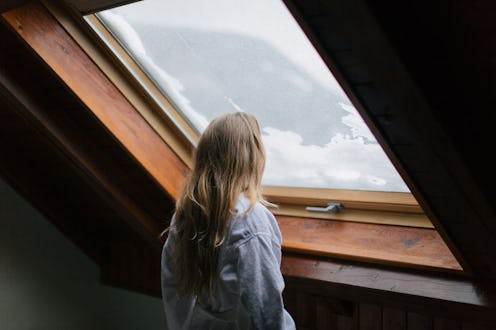Life
If You're Prone To SAD, The Impact On Your Sleep & Sex Drive Could Be Huge

As winter approaches and the days become shorter, more people begin to experience symptoms of seasonal affective disorder (SAD). Mental health charity Mind describes SAD as "a form of depression that people experience at a particular time of year or during a particular season"; while some find their SAD flares in the warmer months, it's most common to experience it in the winter. (Alternatively, the charity notes, SAD can make existing depression more severe.) It can impact your mood, energy levels, and appetite — but seasonal affective disorder's impact on sleep and sex drive shouldn't be overlooked.
According to the NHS, there's no definitive cause of SAD, but it's commonly theorised that "a lack of sunlight might stop a part of the brain called the hypothalamus working properly." This can increase production of the sleep hormone melatonin, limit production of serotonin ("a hormone that affects your mood, appetite and sleep"), and mess with your body clock. Symptoms include low mood, an altered appetite, a loss of interest in things you once enjoyed, increased irritability, and "feelings of despair, guilt, and worthlessness."
But on top of that? SAD can interfere with your sleep, causing you to sleep too much, struggle to fall asleep, or feel lethargic throughout the day. What's more, it can inhibit your ability to orgasm, or curtail your sex drive. With treatments available including light exposure therapy, counselling, and medication, it's worth seeing a doctor as soon as possible if you recognise any of the following symptoms of SAD.
1You Can't Get Up In The Morning
BUPA lists "finding it difficult to wake up in the morning" as a major symptom of SAD, while mental health charity Mind notes you might also struggle to get to sleep at night. It's important not to dismiss sleep difficulties as inconsequential: insufficient sleep isn't only emotionally taxing, but can also increase your susceptibility to high blood pressure, heart disease, diabetes and other health conditions, as the NHS says. If your sleep difficulties have worsened during the autumn or winter, speak to a doctor about whether you might have SAD.
2You're Less Interested In Sex
According to Psychology Today, "decreased libido and sexual desire" towards the end of the year are both indications of SAD. A low sex drive is also a potential side effect of SSRIs, a type of medication frequently prescribed to treat SAD and other forms of depression. The Mayo Clinic lists multiple other factors that might affect your libido, including lifestyle habits, other illnesses, and hormonal changes; if you're worried, talk to a GP about the issue.
3You Sleep For Longer Than Normal
4You Find It Difficult To Orgasm
The medical term for having difficulty reaching orgasm is anorgasmia, and according to the Mayo Clinic, it's a common symptom of depression (like a lack of sex drive, anorgasmia is also a potential side effect of SSRIs). There are numerous types of anorgasmia, from lifelong (you've never experienced an orgasm) to acquired (you've developed an inability to have orgasms) to situational (you can only orgasm in particular situations). Available treatments include therapy, medication, and changes to your sexual activities, so if you're concerned, speak to your GP.
5You're Tired Throughout The Day
According to Psychology Today, people with SAD often experience "low energy and lethargy" during the day; you might find yourself constantly napping, unable to muster the energy to perform routine tasks, or too exhausted to focus at work. Be sure not to dismiss your fatigue or assume it's an inherent part of the work day: it could be a sign of SAD or more general depression, anaemia, chronic fatigue syndrome, or another medical condition, as the NHS says. Or at the very least, it could indicate that your current lifestyle is unsustainable.
So what can you expect if you see a GP about your SAD? The NHS says that a doctor might ask about your "mood, lifestyle, eating habits and sleeping patterns, plus any seasonal changes in your thoughts and behaviour." And if you're diagnosed with the illness, you'll be offered one or several of a range of treatments, including lifestyle changes (like spending time outside or increased exercise), use of a light box to "simulate exposure to sunlight", a prescription for antidepressants, or talking therapy. Don't force yourself to tough it out until winter's over — seek the help that you deserve.